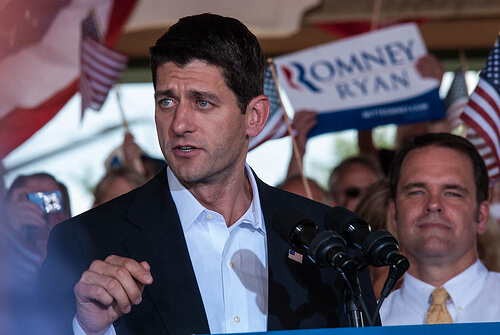 Without question, the big election-related event of the last week was the surprising announcement—both its content and its timing, before the Summer Olympics had ended—of Paul Ryan as Mitt Romney’s running-mate. I cannot recall any such event that (a) had so pervasive an immediate impact on the party in question’s general election strategy, and (b) was welcomed with such joy by activists in both parties.
Without question, the big election-related event of the last week was the surprising announcement—both its content and its timing, before the Summer Olympics had ended—of Paul Ryan as Mitt Romney’s running-mate. I cannot recall any such event that (a) had so pervasive an immediate impact on the party in question’s general election strategy, and (b) was welcomed with such joy by activists in both parties.
The two dimensions of the choice are closely related. Whatever else you think of Romney/Ryan, this ticket represents a large strategic concession to the Obama campaign, which has been struggling all year to convert the election from a referendum on the economy to a choice of two future agendas for the country. Indeed, Romney’s promise that he would sign the Ryan Budget if passed by Congress was exhibit A in that effort. With Ryan on the ticket itself, and drawing enormous media attention for his views, the Obama campaign can declare “mission accomplished” in its most fundamental strategic mission (which is not to say, of course, that the “referendum” phenomenon has gone away entirely or that a downward lurch in the economy between now and November 6 might not be disastrous).
But the excitement of conservative activists about Ryan reflects their own unhappiness with the “referendum” strategy, not to mention their fears that Romney (a) might not be reliable if he wins, and (b) might not have a mandate to carry out the policies they desire. I’ve argued before that one of Romney’s problems is that he’s never quite ended the GOP primaries. The choice of Ryan achieves that objective decisively, and could give the GOP campaign slightly more tactical flexibility that it would otherwise enjoy.
If the Ryan selection was a surprise to almost everyone, it does appear the Romney campaign prepared for it, and quickly deployed both candidates to preempt criticism of the Ryan Budget’s controversial treatment of Medicare by an aggressive ad-and-speech campaign accusing Obama of “cutting $716 billion” from Medicare in the Affordable Care Act. But as Democratic critics have quickly pointed out, the real meta-message of the GOP campaign seems to be the claim that Obama is determined to fleece older white middle-class taxpayers to shower benefits on younger, darker Americans. After the Ryan announcement, the campaign doubled-down on its racially-tinged ad (falsely) accusing Obama of abolishing work requirements for welfare recipients, and also made every effort to depict the president’s alleged “raid” on Medicare as a redistribution of resources to ObamaCare beneciaries (mainly the working poor).
Overall the two campaigns seem to have settled into a shrill competition for undecided non-college educated white voters, with Democrats focusing on every aspect of Mitt Romney’s wealthy corporate background likely to dismay such voters, and Republicans playing the ancient race-based “welfare wedge” game. To put it another way, one side wants white working-class voters to focus their unhappiness up the income ladder, while the other wants them to look down. It’s the kind of left-wing-versus-right-wing populist campaign you might well expect with this small and famously angry segment of the electorate being the almost exclusive focus, though obviously both sides also think these themes will help motivate their respective “bases” as well.
So far there’s not much evidence the Ryan selection has had any tangible impact on support levels for either ticket, but without question it’s already affected strategy and messaging. Since Democrats were already planning a robust national campaign highlighting the many, many unpopular features of the Ryan Budget, they may have a bit more of the initiative at this point, which is why the consensus view of political observers is that Romney took a large and perhaps unnecessary risk in choosing the conservative movement’s single favorite politician as his running-mate.
Downballot primaries were held in Wisconsin, Connecticut and Florida this week. To no one’s surprise, Connecticut Senate candidate and former wrestling entrepreneur Linda McMahon drowned long-time moderate GOP congressman Chris Shays in a sea of money and ideological vitriol, and will be a distinct underdog in a general election battle with Rep. Chris Murphy. In Wisconsin, former Gov. and HHS Secretary Tommy Thompson did surprise a lot of observers by beating back a challenge from three more conservative candidates (notably self-funding banker Eric Hovde and Club-for-Growth candidate and former congressman Mark Neumann). Thompson’s now even money against Democratic nominee Rep. Tammy Baldwin.
Photo credit: monkeyz_uncle